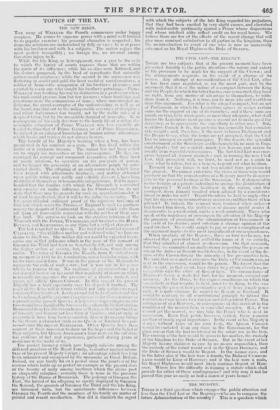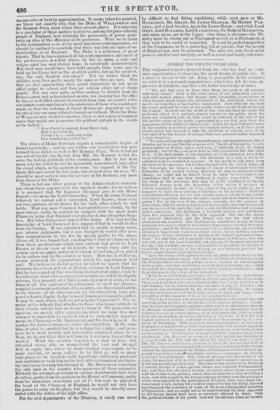THE MINISTRY.
THERE is a third question which engages the public attention not less than the Civil List or the Regency—who are to compose the future Administration of the country ? This is a question which we can solve at best by approximation. It seems taken for granted, we know not exactly why, that the Duke of WELLINGTON and Sir ROBERT PEEL must retain their present places. It is amusing to a spectator of these matters to observe, among the place-adoring people of England, how naturally the possession of power gene- rates an idea of the efficiency of its possessor. Were we to listen to the declamation even of our most ingenious contemporaries, we should be inclined to conclude that there was but one man of un- derstanding in all England. The Duke is a nobleman of great talents. That he has surpassed all his contemporaries, and most of his predecessors, in a field where, by the by, many a rude and vulgar spirit has won eternal fame, is universally acknowledged. But what man would have been bold enoug,h, three years ago, to hold up his Grace not as the greatest soldier, but as the greatest, nay, the only English statesman ? Yet we rather think his abilities were then pretty nearly the same as they are now. Men that are fast approaching their grand climacteric do not much affect going to school, and they are seldom either apt or docile pupils. For our own parts, neither seeking to detract from his Grace's great and acknowledged merits, nor desiring that the office be has so well filled should be wrested from him, we cannot with- out infinite contempt listen to the tow. series of those who would per- suade us that the fortunes of Great Britain are dependent on the breath of any one man within its bounds or without. Were the Duke of WELLINGTON shelfed to-morrow, there is not a man of common sense that might not pronounce his political epitaph in the words of the ballad-
" Now Christ be praised, King Harry said, Sith it no better be, I trust I have within my realm Five hundred as good as he."
The duties of Home Secretary require a considerable degree of formal knowh,dge ; and no one within our recollection has per- fbrmed those duties so well as Sir RosEar PEEL. Were it but for one act of his life, his Special Jury Bill, Sir Itonaar would de- serve the lasting gratitude of his countrymen. But he has done many acts for which he will be nivourably remembered, long after the cloud which, in the opinion of some, his support of the Ca- tholic Bill cast round his lair fame, has cleared a%vay for ever. We should be most sorry to lose the services of Sir RonEar, any inure than those of the Duke.
There is but one other person in the Administration concern- ing whom there appears to be the smallest doubt—for we believe
it is arranged that Sir GEORGE MURRAY goes to the Horse Guards—we mean the Lord Chancellor. When Sir JOHN CoPLEY followed, we cannot call it succeeded, Lord ELDON, there were not two opinions on his fitness for the high office which he still
holds. That any mere Common Law practitioner should, by the most intense study, be enabled to compete with the most acute Chancery judge that England ever produced, was altogether hope- less. But other things were hoped of Sir JoHN. If lw had not the
knowledge of Lord ELDON, it was supposed that he would be free from his failings. It wiv: admitted that he might, in many cases, give inferior judgments, bat it was thought he would offer more than compensation to the few by speedy justice to the many. Above all, it was hoped that, entering the Court of Chancery free from those predilections which long custom had given to Lord ELDON in favour even of its defects, he would cony into the system such an ample and perfect reform as had long been called for by suitors and by the country at large. How has Lord LYND- HURST answered the expectations which his appointment held out? We believe we do not go too tar when we assert that his decisions have been at least as Oatory as those of Lord ELooN that he has copied all 11Rit was blamed. in that great judge, while he has alien thr short of his accuracy :Lod soundness , and for his Equity reforms, they amount, titter three years enjoyment of office, to no- thing at all. The opinion it his colleagues, we need not observe, complet ely coincides wit it that oft he country, else they would hardly, in the absence oC all other reasons 11.r the innovation, have pro- posed a fourth Equity Judge to assist hint in performing his duties. It may be said, where shall we get a bet ter Chancellor ? We are aware of 1 he ridicule that attaches to those who frame cabinets in their closets, and we have no desire to incur it. We pronounce no opinions, we merely offer suggestions, when we name two men whom it is impossible to overlook Mien we contemplate improve- ments in Chanceiy,—Mr. BROUGHAM and Sir JOHN LEACH. As a judge, Sir JouN's claims are above all competition. At the same time, it must be granted that he is nothing but a judge and more- over, he is most usefully and honourably employed Wiler0 Ile is. Now, We do not think that in Chancery it is a mere lawyer that is wanted. What the country requires is a man of largo and extended views, able to compiviiend the vast and unequal field of equity law, where so ninny crooked ways require to be made straight, so many valleys to be filled up, and so many high places to be levelled—with knowledge sufficiently profound and multifarious to fit him for the task of its reformation, and indus- try and energy to carry him through it. Mr. BROUGHAM is perhaps the only man in the country who possesses all these requisites. Hitherto his attempts at reform in various departments have been desultory, partly from his posit ion in the House of Commons, partly from his numerous avocations out of it : but were he placed at the head of the Chancery of England, he would not only have the power to carry on his plans, but they would be directly asso- ciated with the duties of his high office.
For the civil departments of the Ministry, it surely can never be difficult to find fitting candidates, while Such men as Mr.
HUSKISSON, Mr. GRANT, Sir JAMES GRAHAM, Sir HENRY PAR- NELL, and a host besides, are in the Lower House ; and while Lord GREY, Lord HOLLAND, Lord LANSDOWNE, the Duke of RICHMOND, and many more, are in the Upper. One thing is obvious—the Mi- nistry must be strong out of Parliament as well as in Parliament, if they wish to be useful or respected. It is not by packed majorities of the Commons, or by a green bag full of proxies, that the people of England can now be governed. The men who rule them must possess intellect and integrity, as well as court and family influence.



























 Previous page
Previous page